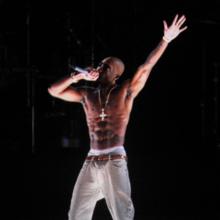hip hop
The themes associated with “Gangster rap” and its successor, “Trap music,” are often thought of as being as far away from Christian morals as the east is from west. Heavy on percussion and profanity, its tracks hit hard and depict the violence of black life interspersed with tales of excess, sex, and money. While some may discount hip-hop music as vulgar entertainment, it indicates a people’s great hunger for getting more out of this world.
It’s not unusual to hear someone rapping about clothes — and how expensive theirs are — on the radio these days. Consider Jay Z and Kanye West’s collaboration “Otis,” where Jay Z belts, “Photo-shoot fresh, looking like wealth / I'm 'bout to call the paparazzi on myself.”
And if you don’t hear about their diamond studded jewelry and designer clothes, some rappers aren’t shy about showing them off in music videos.
But Seattle-based hip hop group Macklemore and Ryan Lewis, who recently hit number one on the iTunes album charts and stopped by D.C.’s 9:30 club on Nov. 13, chose a different approach to the whole clothing concept and, for the most part, hip hop in general.
PORTLAND, Ore. — Hip-hop's all the rage at universities and seminaries these days.
Scholars parse its angry and often violent language. They sift out refrains of religious redemption or clever critiques of modern culture. In some traditionally African-American divinity schools, the rise and fall of response and call, old-school black preaching, is giving way to intricately rhyming rap.
Dozens of pop culture books have been written about using hip-hop to evangelize young people, to relate to their lives and bring them into the organized church. But Monica R. Miller, a visiting professor of religion and popular culture at Lewis & Clark College, warns that looking for religion in hip-hop is a risky proposition.
"Seeing isn't believing," she says. Listeners who point to religious words in lyrics and assume their meaning, or those who spend hours trying to discern some artist's systematic theology, may be wasting their time and effort.
Her new book, Religion and Hip Hop, argues that shared vocabulary doesn't equal shared meaning, and religious language sometimes sells rather than saves. In an interview, Miller talks about religion, hip-hop, and whether and how they overlap.

